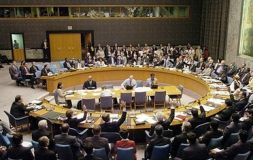UN Security Council to vote new Darfur resolution tomorrow
Aug 30, 2006 (UNITED NATIONS) — The UN Security Council held private talks on a proposal to deploy a robust UN force in Sudan’s Darfur region with the expectation of Khartoum’s consent and decided to vote on it tomorrow.
 The 15-member body huddled for nearly two hours to consider an amended US-British draft that specifically states that the force would be deployed “on the basis of the acceptance of the (Sudanese) government,” an effort to overcome Khartoum’s strong opposition to the deployment.
The 15-member body huddled for nearly two hours to consider an amended US-British draft that specifically states that the force would be deployed “on the basis of the acceptance of the (Sudanese) government,” an effort to overcome Khartoum’s strong opposition to the deployment.
After the meeting, US Ambassador to the United Nations John Bolton told reporters: “Our intention to put have a vote tomorrow… We hoping for unanimous support.”
The draft text calls for a 17,000-strong UN force to take over from the ill-equipped and underfunded African Union (AU) mission, which has been unable to prevent killings, rape and the internal displacement of civilians in Darfur.
Deploying UN peacekeepers is seen as crucial to the success of a fragile Darfur peace agreement signed by the Khartoum government and the main rebel faction in May.
Ghana’s UN Ambassador Nana Effah-Apenteng, the council president for August, stressed that adopting the resolution would not mean “shutting the door to negotiations” with Khartoum.
He said bilateral and multilateral channels would continue to be used to win over the Sudanese government, which strenuously opposed a stro, UN presence in Darfur.
He said charges that the UN would infringe on Sudanese sovereignty did not make sense since a UN mission is already operating in Sudan with the consent of Khartoum.
The draft said the Darfur mission would be carried by expanding the mandate of the 12,273-strong United Nations Mission in Sudan (UNMIS) currently operating in the vast African country, and it urged “member states to provide the capability for an expeditious deployment.”
UNMIS was created in March 2005 to help maintain the tenuous peace between Sudan’s government and former southern rebels who in January of that year signed a peace agreement after 21 years of civil war.
Its role was also to liaise with AU forces working in Darfur.
The US-British text calls for raising UNMIS strength to up to 17,300 troops and up to 3,300 civilian police to monitor implementation of the Darfur peace deal, deploy to buffer zones and refugee camps, and work with Sudanese authorities in rebuilding shattered institutions.
Alluding to Tuesday’s talks in Khartoum between Sudanese President Omar al-Beshir and US Assistant Secretary of State for African Affairs Jendayi Frazer, Bolton said changes would be incorporated in the draft as a result of those discussions.
Beshir apparently rebuffed a plea from Frazer to allow a UN force into Darfur. However, the State Department said Beshir would send an envoy to Washington in the near future.
“We said from the outset we did not contemplate that the UN peacekeeping force was going to fight its way into Darfur,” Bolton said. “But we think it’s important that the question of consent not hold up the operational steps at need to be taken to get this force deployed as rapidly as possible.”
“Once the resolution is passed, the consent (from Khartoum) may be forthcoming more rapidly than people think,” he added.
Acting under Chapter Seven of the UN charter, which authorizes military action in cases of threats to international peace and security, the UN force would be mandated to use all necessary means to protect UN personnel, humanitarian workers and Darfur civilians.
Beshir had outlined an alternative plan to deploy 10,500 Sudanese government troops by early January to provide security in Darfur. But diplomats here said the people of Darfur have little trust in Sudanese government troops and noted that UN peacekeepers offered the best guarantee of impartiality.
Washington accuses Sudanese government troops and their proxy Janjaweed militia of genocide over their fierce repression of the uprising launched by ethnic minority rebels in February 2003.
And Beshir, in turn, charges that Washington and other Western powers are furthering imperialist plans in Darfur, and the recent Israeli offensive in Lebanon only appeared to consolidate his opposition to a UN deployment.
The combined effect of war and famine in Darfur has left as many as 300,000 people dead in the region and displaced more than two million.
(ST/AFP)
